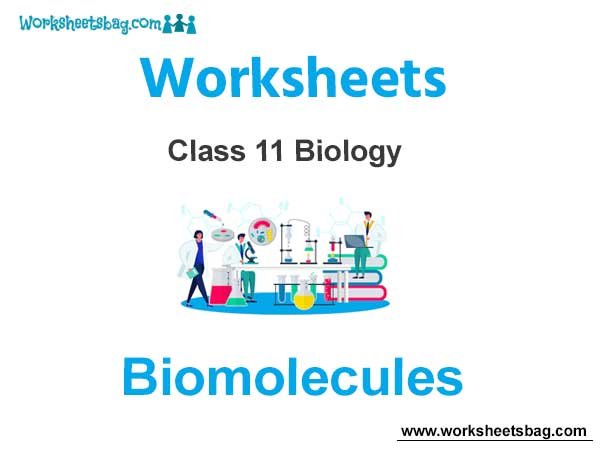Students should refer to Worksheets Class 11 Biology Biomolecules Chapter 9 provided below with important questions and answers. These important questions with solutions for Chapter 9 Biomolecules have been prepared by expert teachers for Class 11 Biology based on the expected pattern of questions in the Class 11 exams. We have provided Worksheets for Class 11 Biology for all chapters on our website. You should carefully learn all the important examinations questions provided below as they will help you to get better marks in your class tests and exams.
Biomolecules Class 11 Biology Worksheet
Question. Pigments are considered as the secondary metabolites, having some particular functions. Which of the following is an example of pigments?
(a) Carotenoids
(b) Codeine
(c) Concanavalin-A
(d) Curcumin
Answer
A
Question. Which of the following is the molecular formula of Palmitic acid ?
(a) CH3(CH2)2COOH
(b) CH3(CH2)14COOH
(c) CH3(CH2)16COOH
(d) CH3(CH2)18COOH
Answer
B
CH2?OH
l
Question. CH?OH is the structure of which of the following compounds?
l
CH2?OH
(a) Glyceraldehyde
(b) Glycerol
(c) Glyceric acid
(d) Triglycerides
Answer
B
Question. Which of the following compounds is used in the chemical analysis of living tissue?
(a) CH3COOH
(b) Cl3CCOOH
(c) HCHO
(d) C6H12O6
Answer
B
Question. Which of the following structures represents serine?

Answer
C
Question. Which of the following can not be considered as the example of polymeric substances?
(a) Rubber
(b) Gums
(c) Cellulose
(d) Vinblastin
Answer
D
Question. Which of the following is micromolecule ?
(a) Lipid
(b) DNA
(c) Protein
(d) All
Answer
A
Question. Physical and chemical properties of amino acids depend on
(a) Amino group
(b) Carboxylic group
(c) R-group
(d) All of the above
Answer
D
Question. Which of the following elements present most abundantly on earth crust?
(a) Carbon
(b) Hydrogen
(c) Oxygen
(d) Silicon
Answer
C
Question. Which of the following can be included along with biomolecules?
(1) Carbohydrate
(2) Protein
(3 Lipids
(4) Nucleic acid
(5) Vitamins
(6) Minerals
(7) Water
(a) 1, 2, 3, 4, 5, 6, 7
(b) 1, 2, 3, 4, 5, 6
(c) 1, 2, 3, 4, 5
(d) 1, 2, 3, 4
Answer
C
Question. Select the correctly matched.
(a) Anthocyanins – Alkaloids
(b) Carotenoids – Toxins
(c) Ricin – Drugs
(d) Lemon grass oil – Essential oils.
Answer
D
Question. Inulin is a polymer of
(a) Glucose
(b) Amino acids
(c) Fructose
(d) Nucleotides
Answer
C
Question. Which of the following is acidic amino acid.
(a) Glutamic acid
(b) Aspartic acid
(c) Ascorbic acid
(d) Both (a) and (b)
Answer
D
Question. In proteins, amino acids are attached together by :
(a) Peptide bond
(b) Amide bond
(c) Ester bond
(d) a & b both
Answer
D
Question. When a dry piece of tissue is fully burnt, all the carbon compounds are oxidised to gaseous form and the remaining is called ‘ash’. The ash contains all of the following, except.
(a) Calcium
(b) Magnesium
(c) Sulphure
(d) Nucleic acid
Answer
D
Question. Which of the following is not the example of aromatic amino acid?
(a) Tyrosin
(b) Tryptophan
(c) Threonin
(d) Phenylalanine
Answer
C

